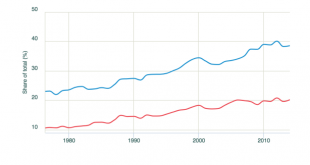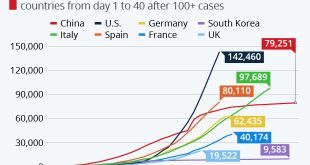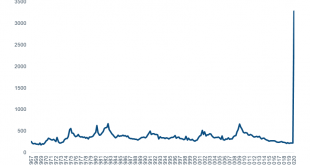from David Ruccio In the United States and around the world, governments are responding to the twin pandemics—of novel coronavirus and escalating unemployment—with massive bailouts. Not unlike what happened more than a decade ago, after the global crash of 2007-08. But there seems to be something different this time around—not only because of the speed of both the viral contamination and the economic meltdown, but also as a reaction to the terms of the bailout that was enacted in the...
Read More »Open thread March 31, 2020
Class Warfare
The Covid-19 pandemic is the physical manifestation of a deeper disease plaguing the West: Class Warfare. The veil has been lifted. Social distancing, a legitimate response to Covid-19, predominately affects the working class. Fortunately, Covid-19 is an equal opportunity plague: As the rich and powerful congratulated each other, as they moved among the rightfully adoring crowds…oops, I think I caught something! Just hazards of the games they play....
Read More »Covid-19 and the magic money tree
from Lars Syll What will be the lasting effects of the covid-19 pandemic? Start with the size of the state. Over the next year government debt will rise sharply, as spending jumps and tax revenues collapse. When the economy recovers, attention will turn to paying it down. “Capital and Ideology”, a new book by Thomas Piketty, shows that after the first and second world wars many governments in the West turned to heavier taxation of the incomes and wealth of the richest to achieve that goal...
Read More »Coronavirus: upward trajectory or flattened curve?
Γιατί ο τουρισμός (η δήθεν «βαριά (sic!) βιομηχανία της χώρας) είναι ένα σοβαρότατο διαρθρωτικό πρόβλημα (και όχι πλεονέκτημα) της ελληνικής οικονομίας
Γιατί ο τουρισμός (η δήθεν «βαριά (sic!) βιομηχανία της χώρας) είναι ένα σοβαρότατο διαρθρωτικό πρόβλημα (και όχι πλεονέκτημα) της ελληνικής οικονομίας Μέσα στην διπλή (υγειονομική και οικονομική) κρίση, όλες οι επίσημες εκτιμήσεις εστιάζουν στις επιπτώσεις κυρίως στον τουρισμό. Η έμφαση αυτή δεν είναι αδικαιολόγητη γιατί ο τουρισμός συνεισφέρει σημαντικά ιδιαίτερα στο ΑΕΠ του 2ου και του 3ου τριμήνου της ετήσιας δραστηριότητας της οικονομίας. Αν και η συμβολή αυτή είναι συνήθως...
Read More »Much stronger conditions needed on federal wage subsidy program
The federal government has announced it is prepared to pay wages subsidies of up to 75% of employee wages for all private businesses and other employers, including non-profits, partnerships and charities that expect a 30% drop in revenues, up to a maximum of $847/worker per week and $11,011 over the three months. The previously announced 10% wage subsidy was only available for smaller employers. There’s no question about it: this is a massive commitment that is likely to be the most...
Read More »Much stronger conditions needed on federal wage subsidy program
The federal government has announced it is prepared to pay wages subsidies of up to 75% of employee wages for all private businesses and other employers, including non-profits, partnerships and charities that expect a 30% drop in revenues, up to a maximum of $847/worker per week and $11,011 over the three months. The previously announced 10% wage subsidy was only available for smaller employers. There’s no question about it: this is a massive commitment that is likely to be the most...
Read More »Here we go
from Peter Radford We all thought that this morning’s announcement of the new claims for jobless insurance would be shocking. The usual scuttle in the financial markets had been that we might see numbers well over 2,000,000, but the actual number soared even beyond that. At 3,283,000 it is difficult to articulate what this means. To put it in some sort of perspective, the previous week had seen 282,000 new claims, and the previous all-time record high of 695,000 had been set back in...
Read More » Heterodox
Heterodox





